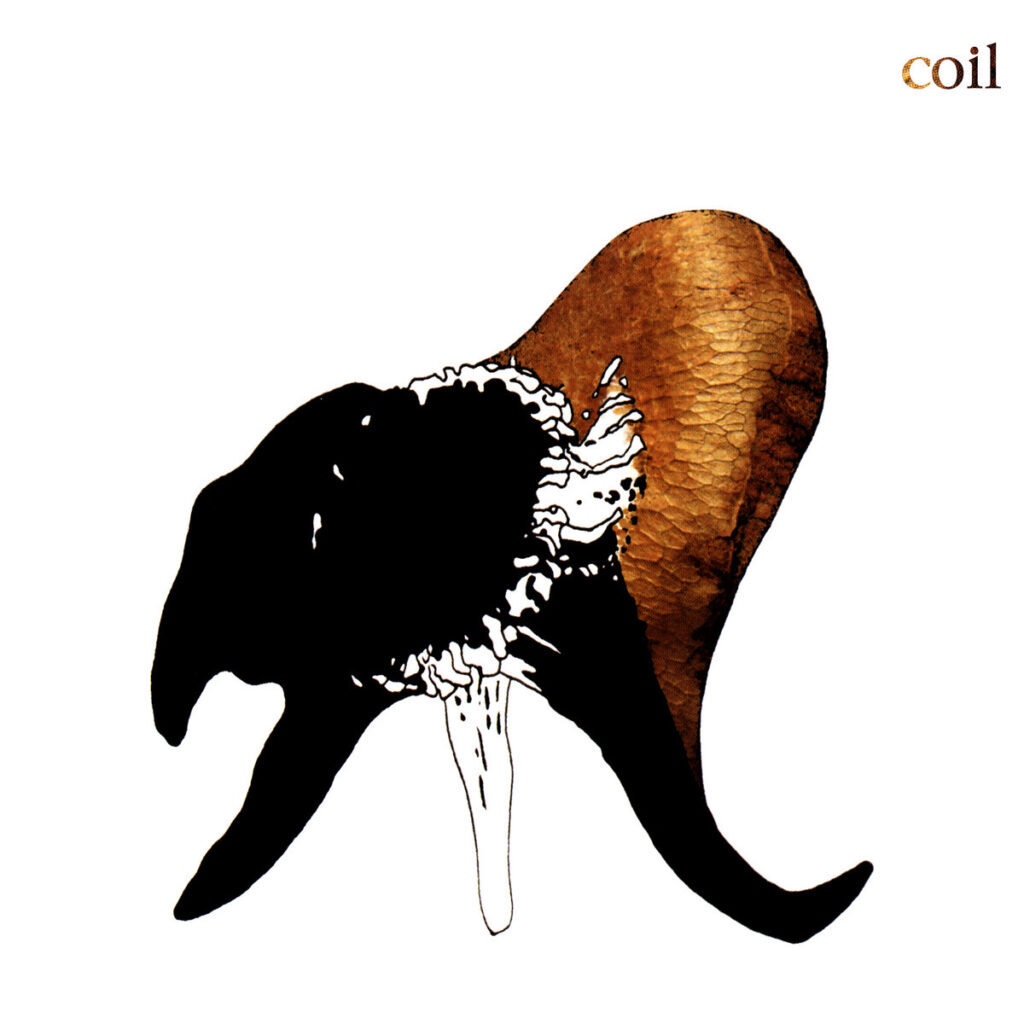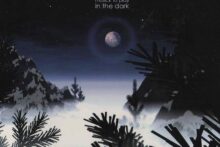Black Antlers comes with less of the mythos that attaches itself to other Coil albums. Where Time Machines, Loves Secret Domain, Horse Rotorvator and so on inspired nerdy obsessions with the eldritch mechanisms used to create them – a determined perpetual state of constant evolution and hedonistic experimentation via narcotics and pharmaceuticals, home studio tech, countercultural mining, occult practice and sundry other alternative states – Coil’s penultimate studio album superficially seems more ordinary. It is, after all, one where they embraced more conventional song structures, including the wonderful take on English folk staple ‘All The Pretty Little Horses’ and the same might have gone for their life outside music. In late-period Coil interviews John Balance and especially Peter Christopherson often stressed that they weren’t (entirely) dark magi, cracking one off into Austin Osman Spare toilet paper, but fairly ordinary domestic people. Unfortunately, not everyone wanted them to be that way, and this tension, alongside the tragic circumstances of its creation, shapes Black Antlers.
Coil historiography can often be complex and impenetrable, a confusing warren of CDRs, alternate versions, live recordings and so on, so credit to Dais for putting together thorough notes on the making of the record. Christopherson, Balance and Thighpaulsandra were joined by classically-trained percussionist Tom Edwards, hurdy-gurdy player Cliff Stapleton and Mike York (now of The Utopia Strong) on pipes. It was initially released as a work in progress in June 2004, with plans to finish the record in September. Two months later, Balance was dead. Black Antlers was eventually completed with Danny Hyde in 2006, and this is the version being reissued here.
Black Antlers begins with the uneasy hum of ‘The Gimp (Sometimes)’, before Balance, his voice whooshing above the contaminated estuarine murk of the track, half whispers, half sings: “Sometimes I hurt myself / Sometimes I hate myself / Sometimes I just hurt myself / Sometimes I just help myself”. You only need to look at the various online groups devoted to Coil to see that there’s a fair amount of mumbo jumbo expended by some fans, a voyeuristic fascination with the psychic self-scarification they put themselves through to create. Did the expectation for Coil to be occult-dabbling hedonists push Balance to such extremes that eventually the demands of the myth consumed the man?
This thought hangs over ‘The Gimp’ and makes it such a complicatedly beautiful listen – the track remains humidly erotic, despite the genuine agony of the lyricism. It perfectly sets up ‘Sex With Sun Ra (Part One – Saturnalia)’, one of Coil’s finest moments. There’s something playful, even quite funny about imagining sex with the poet/philosopher of spiritual jazz: “Sun Ra was here in his element / he invited me up for a ride” is one of the great couplets, up there with Bowie’s “don’t look at the carpet / I drew something awful on it”. It rolls forward shimmering with sweat and heat – music critic David Stubbs once said to me that the remarkable thing about ‘Sex With Sun Ra’ is that Coil actually managed to capture what it might be like to cop off with the old goat. Yet the eroticism comes to us, twenty years later, with a haunting twist as Balance intones, “Most accidents occur at home / Not Harry Smith’s room at the Chelsea Hotel”. It’s a dreadful prefiguring of his fatal fall in the house he shared with Christopherson in Weston-Super-Mare, an accident that occurred in an ordinary home in an ordinary town in England. It’s rare that a piece of music can be so shaped by outside events, the most significant of which happened after its creation, and end up pulling in so many directions at once. In ‘Sex With Sun Ra’, the carnal and the mortal are forced into an eternal embrace.
That Black Antlers is a troublingly beautiful listen is reinforced by a version of ‘Teenage Lightning’, a track that evolved over fifteen or so years. There is a recording from a May 2004 gig in Paris in which Balance describes it thus: “we always say that ‘Teenage Lightning’ is about the energy generated by two teenagers rubbed together”. He does go on to include “old age pensioners” and of course could be referring to teenagers above the age of consent, but then I think of the video for ‘Love’s Secret Domain’ and feel that this might be generous. There is certainly a boundary being tested here, and I am not sure it is a healthy one – I after all have (literal) skin in this game. In my book Out Of The Woods, the heaviest chapter, in which I write about youthful encounters with pederasts in municipal toilets, was named ‘Teenage Lightning’ after it. I borrowed Coil’s title in both a tribute, and accusation that they were at best playing with a particularly grim fire in this fetishisation of the teenage male. It’s a song that is traumatic and triggering to listen to, yet I find it utterly beautiful, the rolling melodic rhythm, the electronic stuttering, the gentle and reflective piano. Coil remain underrated as sonic channellers of the English landscape, and ‘Teenage Lightning’ evokes Cluster doing a Watership Down-esque pastoral trip down a deep Dorset lane.
Transgression (sexual, narcotic, societal) is barely ever interesting for its own sake and is as likely to be tawdry as transcendent. In Coil’s nudge-nudging about the fetishisation of teenage sexuality it ought to be more akin to the former than the latter. Yet when Coil were at their best, as they were here, the music itself never becomes bogged down by all this – I love this song even as it haunts me.
If ‘Sex With Sun Ra (Part One – Saturnalia)’ is Coil at their most erotic, the ‘Sigillaricia’ version that opens the second side has a startling twist. It starts with organic mechanical rhythms before pipes come wailing over the top. As Balance sings the mixture of the fantastical (“Desert venom / Military temples / Black wings flying out without management or plan”) and the intimate (“I will be all right if you kiss me / I will be all right if you hold me”), something happens that in makes this incarnation feel so much more tender. I don’t think it far-fetched to hear in the lyricism both the visionary landscapes that Balance had visited, and a sense of his personal agony. Even with Coil’s history of multiple versions of one song, this shapeshifting is uncanny in its power.
It’s followed by ‘Departed’, a deep panic attack, perhaps of grief. Then ‘Things We Have’, a tying together of the musical motifs of the record, including a minimalist fragment of the melody of ‘Teenage Lightning’ that drops like cold rain from oak leaves towards the end. It uses fragments of ‘Broccoli’, Coil’s elegiac song of mourning the loss of your parents, but rather than the full lyrics all we hear is Balance whispering “wise words from the…” but never completing the line as it should be – “wise words from the departing / (By working the soil we cultivate the sky)”. He never passes on the advice to eat your greens – it’s as if in the final version of the song Christopherson is conveying an absence of comfort, and an overwhelming sense of loss. This would be completed on Coil’s final album, Ape Of Naples which, led by Balance’s voice, became his and their epitaph.
Many of Coil’s pursuits that were once transgressive – psychedelic drugs, an interest in the occult and magic, open sexuality, even tattooing and body modification – are now mainstream-adjacent, Instagram-friendly lifestyle signifiers. They’re even boring in how in certain self-congratulatory ‘alternative’ spaces they’ve becoming ubiquitous, even conformist in their performance. For all their magical (spell it how you like) voyaging and pushing of boundaries, both musical and moral, perhaps Coil ended up being at their very best in Black Antlers, a record that became a sonic cradle for the death of one of its creators. However strange it might sound, death is after all the most ordinary thing humans know.



